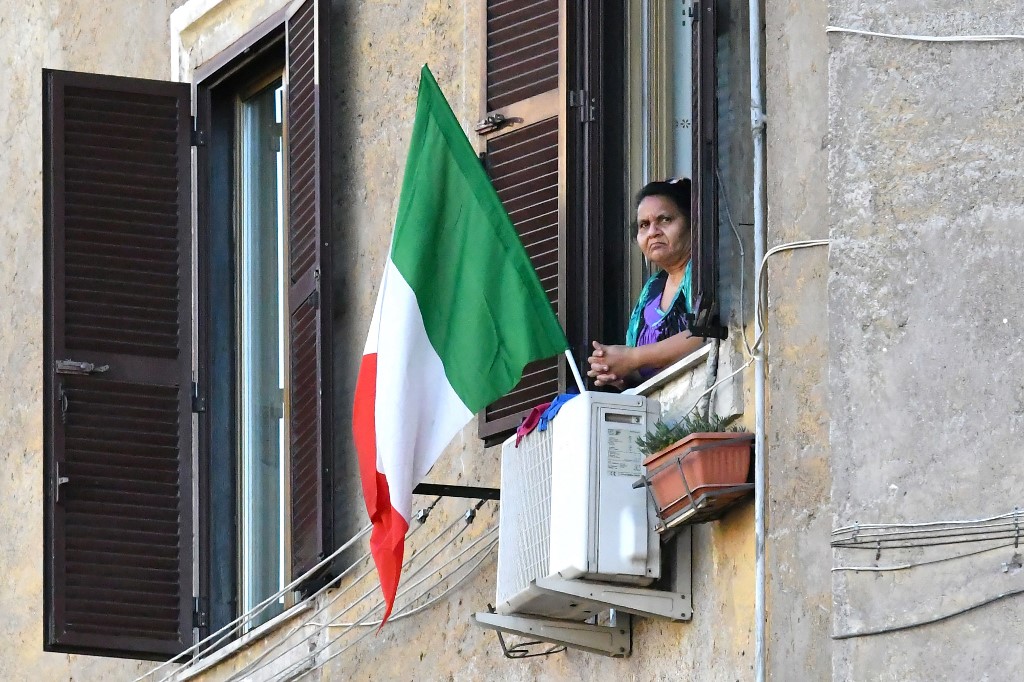European nations prepared over the weekend for further cautious easing of coronavirus restrictions following signs the pandemic may be slowing, with hard-hit Italy set to follow Spain in allowing people outside after weeks of confinement.
More than 243,000 people have been killed and 3.4 million infected worldwide by the virus, which has left half of humanity under some form of lockdown and pushed the global economy towards its worst downturn since the Great Depression.
With signs that the spread of the disease is coming under control, parts of Europe, Asia and the United States have begun to lift restrictions to try to inject life into economies crippled by weeks of closures and ease the pressure on populations weary of confinement.
After a two-month lockdown, Italians on Monday will be allowed to stroll in parks and visit relatives. Restaurants can open for takeaways and wholesale stores can resume business, but there was some confusion about the extent of the easing.
Romans were doing aerobics on their rooftop terraces and exercising indoors on Sunday and the squares in the city centre were mostly empty on the last day Italians were obliged to remain within 200 metres of their homes.
“On the one hand, we’re super excited for the reopening, we’re already organising various activities the kids will be able to do with their grandparents outdoors, workshops in the garden, that sort of thing. The kids can’t wait to see them,” said Rome resident Marghe Lodoli, who has three children.
“On the other hand, it’s disorientating. The rules are not clear, and we’re not sure if just using common sense will do.”
‘Past the peak’
Italian authorities have said some preventative measures are still needed in a country that has the second-highest number of virus deaths in the world after the United States.
Several industries including automobile sector and construction have already restarted work.
But Italy’s 20 regions have imposed their own regulations, leading to some confusion over what people can and cannot do. Veneto and Calabria lifted their lockdowns early and allowed bars and restaurants to open with outdoor tables.
Elsewhere in Europe, Germany will continue its easing on Monday, while Slovenia, Poland and Hungary will allow public spaces and businesses to partially reopen.
In another sign of life returning, Germany’s minister for the interior and sport said Sunday he supports a resumption of the country’s football season this month as long as teams respect hygiene conditions.
The British government will unveil its own “roadmap” to ease the country out of lockdown this week, after Prime Minister Boris Johnson said the country was “past the peak” of the outbreak.
With health experts warning the disease could hit hard once again, governments are trying to balance easing up restrictions to help battered economies against the risk of fresh outbreaks.
Despite moves to ease curbs across the globe, more than 4.6 billion people are still on some form of lockdown or obligation to stay confined at home.
Most governments are sticking to measures to control the spread of the virus – social distancing and masks in public – and more testing to try to track infections even as they relax curbs on movement.
Face masks will be mandatory on public transport starting Monday in Spain, where people were allowed to go outdoors to exercise and walk freely on Saturday after a 48-day lockdown.
Even as some European countries gradually lift restrictions, officials in Moscow – the epicentre of the contagion in Russia – urged residents to stay home.
With cases increasing by several thousand each day, Russia is now the European country registering the most new infections.
Prepare for ‘bad scenarios’
European leaders are backing an initiative from Brussels to raise 7.5 billion euros ($8.3 billion) to tackle the pandemic and raise funds for efforts to find a vaccine for Covid-19, the disease caused by coronavirus.
Italy’s Prime Minister Giuseppe Conte, French President Emmanuel Macron, and Germany’s Chancellor Angela Merkel gave their support in an open letter in weekend newspapers.
With pressure growing on governments worldwide to balance public health requirements with the need to ease intense economic pain, some nations in Asia announced similar easing measures.
South Korea – once the second worst-hit nation on the planet – said on Sunday it would ease a ban on some gatherings and events as long as they “follow disinfection measures”.
Thailand allowed businesses such as restaurants, hair salons and outdoor markets to reopen so long as social distancing was maintained and temperature checks carried out.
But experts have cautioned that many countries are still not through the worst.
The Philippines suspended all flights into and out of the country for a week starting on Sunday in a bid to ease pressure on its congested quarantine facilities.
Iranian President Hassan Rouhani announced mosques would reopen across large parts of the Islamic Republic, after they were closed in early March to try to contain the Middle East’s deadliest Covid-19 outbreak.
Rouhani warned, however, that while Iran would reopen “calmly and gradually”, it should also prepare for “bad scenarios”.
‘Beyond breaking point’
US leaders face immense pressure to ease virus measures as the economy has been hammered with tens of millions left jobless.
The United States has the most coronavirus deaths in the world and President Donald Trump is keen for a turnaround to help reduce the economic pain.
Florida is set to ease its lockdown on Monday, as authorities in other states wrestle with pressure from demonstrators – some armed – who have rallied against the lockdowns.
There are signs that the pandemic is slowing down in some parts of the United States.
In New York City, the epicentre of the US outbreak, an emergency field hospital erected in Central Park is set to close, the Christian charity running it said on Saturday, as virus cases decline in the city.
But authorities are wary of letting their guard down too fast, with fears the virus could wreak havoc in the most vulnerable communities in the United States.
A massive wave of infections is sweeping through America’s prison population – the world’s largest at 2.3 million – with coronavirus deaths on the rise in jails and penitentiaries across the country.
Riots over inadequate protection and slow responses by authorities have already broken out in prisons in Washington state and Kansas.
“Things are beyond breaking point at this facility,” said Brian Miller, an officer at Marion prison in Ohio. “Right now it’s hell.”
AFP
























